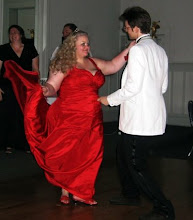Consistent and alert readers of this space will recall that back in September I declared a “sci-fi free fourth quarter,” intending to use the last three months of 2008 to catch up on some books without robots in them that I had meant to read but never actually had. While this ended up as a total success, I never actually got around to writing reviews for the blog, like I intended. But, under the basic aegis of "better late than never,", here we are.
Never one to start slow, I opened up with Shakespeare’s Henry IV, part 1. (I’ll leave the plot summary to wikipedia.)
Look, am I going to loose my English Minor street cred if I say I didn’t think Falstaff was funny? Great character, well written, interesting actions – but not funny. I could see how a talented comic actor could really milk the character for some humor, but the lines as written – not funny. Whoever played Falstaff on the stage for the first time must have really made an impression because I can’t believe anyone could read the script and say “comic genius!”
Other than a vague sense of disappointment at the comic stylings of Sir John Falstaff, the play is excellent. The plot rocks along towards the Battle of Shewsbury, the characters are all interesting and well written – in short, everything one would expect from one of The Bard’s most popular and successful plays. It’s hard to come up with something intelligent to say about a play that’s been chewed over for 400 years, so I’ll more or less leave it at that.
One other thing did surprise me, however; how sympathetic the play was towards the rebels in general, and Hotspur in specific. While Prince Hal is certainly “the good guy,” and the main protagonist, his father Henry IV is in many ways the closest the play has to an antagonist. Hotspur and the rest of the rebels have a point, which the play goes to some length to support – they have been treated abominably by the King – the king whom they placed on the throne as part of a coup, and when he fails to live up to the bargain they decide to remove him. The play presents the rebels as being in the moral right – they just loose, and Prince Hal grows up. The amount of gray in the delineation of which characters are good guys versus bad guys surprised me – in a good way.
Thursday, March 19, 2009
Subscribe to:
Post Comments (Atom)






No comments:
Post a Comment